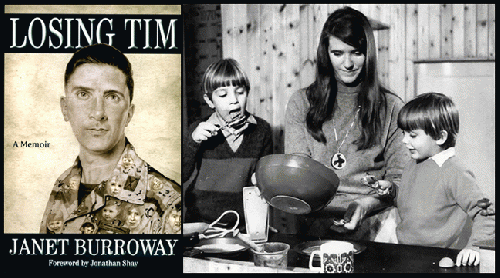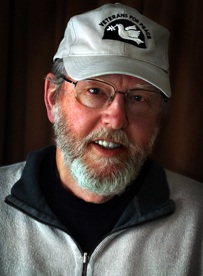I met Janet Burroway when I was a Vietnam veteran on the GI Bill at Florida State University and I signed up for a creative writing workshop she was just hired to teach. She was a worldly, published novelist seven years older than me. She had just left an oppressive husband, a Belgian, who was an important theater director in London where she'd been to parties with the likes of Samuel Beckett. I graduate in 1973, and in a turn of events that still amazes me, I asked her out and ended up living with her for a couple years. She had two beautiful boys, Tim, 9, and Toby, 6, who I grew to love.

The cover of Losing Tim; and Tim, Janet Burroway and Toby in England circa 1971
(Image by unknown) Details DMCA
Cut to 2004. Even as a kid, Tim had a hard-headed moral code about what was right and wrong. As he grew into manhood, he became enamored of all things military; he loved guns. He had a career in the Army as a Ranger, where all his evaluations suggest a stellar soldier. He reached captain, but a promise to his wife and other reasons led him to resign his commission in the active Army. He worked in the Army reserves for a while in places like Bosnia. Contacts led him to civilian jobs in the military contractor world in Africa and Iraq, where he ended up running de-mining operations and training de-miners for RONCO Consulting Corporation.
The details are not absolutely clear. Tim was certainly disillusioned from his experiences in Iraq and was apparently sinking into depression. For reasons only he could know, one afternoon he put a nine-millimeter pistol to his head and, in front of Birgett, shot himself dead at age 39.
What is one to make of an act like this? What is a mother to make of the death of her son in this way -- especially a mother who throughout her son's military and contractor career was politically at odds with her son and against the war in Iraq? If that mother is a respected novelist with a talent for spare, honest prose, the answer is a memoir like Losing Tim, just published by Think Piece Press.
For a flavor of the writing in Losing Tim, here's Burroway on the political tension between her and Tim and how it matured her as a mother:
"Here's the irony: that nothing led me toward eventual adulthood quite so insistently as the passive endurance of my disappointment -- that I had borne, and must adore, a golden right-wing gun-toting soldier son."
Burroway has published eight novels, as well as plays, essays, poetry, creative writing textbooks and children's books. Her latest novel Bridge of Sand was published in 2009 by Houghton Mifflin Harcourt. Her novel Raw Silk was just re-issued by Open Road. She's now at work on a musical adaptation of Barry Unsworth's novel Morality Play set in medieval Europe and a play about her son Tim. She is the Robert O. Lawton Distinguished Professor Emerita at Florida State University and won the 2014 Lifetime Achievement Award in Writing from the Florida Humanities Council.
Although I've not seen any of the Burroway family for 38 years, Tim Eysselinck's story is personally heart-breaking for me. Like his mother's inclination in Losing Tim, I can't divorce his death from the corrupt politics of war in America. I've been immersed in the business of soldiers and veterans and post traumatic stress and anti-war politics for the past 35 years. Coincidentally, in December 2003 -- the point Tim's disillusion was growing -- I was in Baghdad with a group of antiwar veterans and military family members on a two-week fact-finding trip. We were told by Paul Bremer's assistant that family members visiting their sons and daughter in a US war zone was unprecedented.
When we got home, I was part of a three-hour press conference on C-SPAN at the Washington Press Club. We talked about how and why the invasion/occupation was a debacle, how a home grown insurgency was on the rise motivated by defense against our troops and how our leadership had betrayed the American people and had handed the nation a dishonest quagmire war.
Janet Burroway in her writing office; and Tim Eysselinck with war detritus in Iraq
That was the detached observations of a drop-in journalist. For Tim, it was his whole life. People were beginning to shoot at his team. There were roadside bombs. He mentioned to friends witnessing a disturbing, cavalier attitude toward civilian casualties. During his visit to Tallahassee, Burroway writes, "... he was disillusioned with the Bush administration and the Paul Bremer regime. ... He seethed: the corruption, the incompetence, the lies, the greed, the stupidity!" (Italics in original) At one point he says, "I'm ashamed of being an American." He later says to his wife, "I'm tired of being the bad man."
Burroway quotes David Hume: "Suicide is a permanent solution to a temporary problem."
In a disgraceful hearing over post-suicide benefits for Tim's family, RONCO attorneys argued that Tim didn't suffer from Post Traumatic Stress. The corporate lawyers diminished their dead employee in any way they could to avoid paying money. They suggesting the de-mining work in Iraq was not dangerous and that Tim had never experienced combat or seen anything unpleasant. The Houston judge laid down for RONCO.
This kind of profit-focused, corporate dishonesty and lawyerly manipulation is, in fact, the real problem. The Iraq War was a great shining moment for corporate/finance war profiteers like Dick Cheney. Military tasks were privatized, which meant they became morally unaccountable profit centers that fell outside the public radar. Privatized war employees were/are, it's true, well paid, but more important they became unseen and expendable. In such a cold-blooded, bottom-line oriented world, an employee's PTSD diagnosis becomes something for lawyers to argue ad-nauseum into meaninglessness.
(Note: You can view every article as one long page if you sign up as an Advocate Member, or higher).




